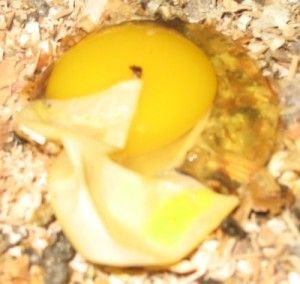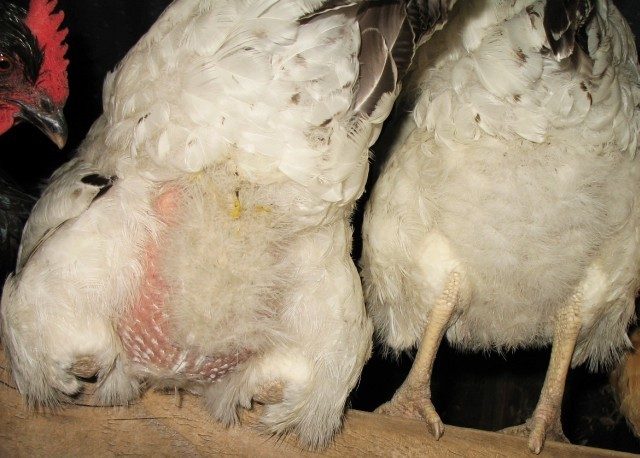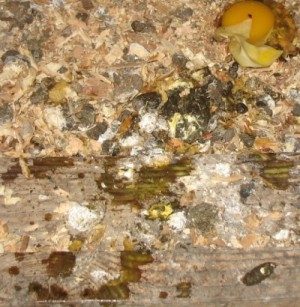Im not worried about a hen laying a rubber egg, that just happens sometimes , however, the fact that she has egg yolk near her vent makes me concerned that she has broken an egg internally.
If a rubber egg breaks inside her and then is expelled, then it isnt as much of a problem as when a normal eggshell breaks internally, because the shell pieces can cut her up inside. She could also be egg bound which can cause all kinds of problems ranging from a deadly infection to prolapsed vent, to backed up plumbing.
NOTE:Edited 4/6/07 8pm to clarify and to add that Wes has indicated that even a soft egg can cause a serious infection if broken internally and then the hen would need antibiotics.
Did you see any blood around the vent?
Is she behaving normally or is she acting like she is straining to lay an egg?
Is she eating and drinking or is she looking lethargic?
If she is behaving normally, doesnt appear in pain or distress, and doesnt have blood around her vent, then I would wait and watch her.
If she seems unable to pass an egg, seems distressed, ill, in pain, or you see blood, then here are some suggestions :
Separate her.
Plan on keeping her separated from the other hens for a couple days so that you will know if she passes an egg, what condition the egg is in (although a broken egg will often be eaten right away) and so that the other hens do not peck at her vent if she has egg yolk or blood in the area.
Examine her externally.
Examine her by gently feeling her belly from the outside. Can you feel a hard egg? If so, you
can give her a warm bath (see instructions below) and massage her belly towards her vent to help move the egg out.
Examine her internally.
Now, I can understand that you might not feel that you know your hen well enough to check inside her vent for an egg or shell pieces, but it really might be necessary. You could put on a pair of surgical gloves if that makes you feel better and put some vasoline or mineral oil on your finger and then just gently feel around inside her vent to see if you can feel a hard egg or sharp shell pieces.
This will not only give you an idea of what might be going on, but it will also apply some lubricant where it might do some good if there is an egg stuck in there. If you feel any broken pieces of shell, see if you can carefully slip them out without cutting her.
Unfortunately, they sometimes get twisted inside and it becomes impossible for the egg to come out without surgery, or it causes the reproductive tract to prolapse (invert itself outside of the vent). If that happens then you need to gently push the prolapsed part back inside and hope it stays, but often that becomes chronic and requires culling.
Giving a chicken a massage bath:
You can use rubbermaid tote, a baby bath, a 5 gallon bucket or an old dishpan for the bath. I use the sink on my back porch or the laundry sink. (Some folks use their kitchen sink but I dont suggest that for sanitary reasons... )
Check the water temperature the same as you would for the baby, good and warm but not hot.
Lower her gently in the water. It should come up to her back. Keep your hand over her back to prevent sudden escape attempts and to keep her from losing her footing and panicking. Either one will result in her flapping her wings and you will get soaked.
Massage her belly gently moving in the direction of her vent. She should relax in the warm water. Some birds even fall asleep.
Getting her dry.
After the bath, wrap her in an old towel and put her under a warm lamp or inside the house to keep her warm. Keep her wrapped in the towel for at least 15 minutes, or longer, to absorb as much of the water from her feathers as possible. Then move her to a rubbermaid tote or a dog/cat carrier with a lot of shavings to help dry her. Again, keep her inside until she is dry, it will take overnight, and she needs to be in a warm place. It takes a long time for them to get dry all the way to the skin unless you want to speed the process with a hair drier. Amazingly, after the first minute or two, they dont seem to mind the hair drier. Just be sure to frequently use your other hand, between the hair drier and the bird, to be sure that it isnt too hot.
(note: a bath to prepare a chicken for a show or to treat mites/lice would require the additional steps of shampooing the bird plus rinsing a couple of times. I dont recommend that you do that while the chicken is already in distress)
chel











